US History: Reformers' Ethics and Civics in the 19th-20th Centuries
VerifiedAdded on 2022/08/12
|5
|1072
|28
Essay
AI Summary
This essay examines the Populist and Progressive movements of the late 19th and early 20th centuries in the United States, focusing on their ethical and civic dimensions. The essay begins by identifying the key figures and motivations behind these reform movements, highlighting their shared goals of addressing social and economic inequalities. It delves into the methods employed by reformers to achieve their objectives, such as civic engagement through political activism, advocacy for legislative changes, and the promotion of social reforms. The essay also explores the ethical considerations that guided the reformers, including their stance on issues such as women's suffrage, labor rights, and the regulation of businesses. By analyzing the historical context, the essay offers a comprehensive overview of the impact of these movements on American politics, economics, and society, and assesses the significance of their contributions to the nation's history. The provided solution showcases the analysis of the reformers, their methods, and the ethical considerations they took into account in pushing reforms.
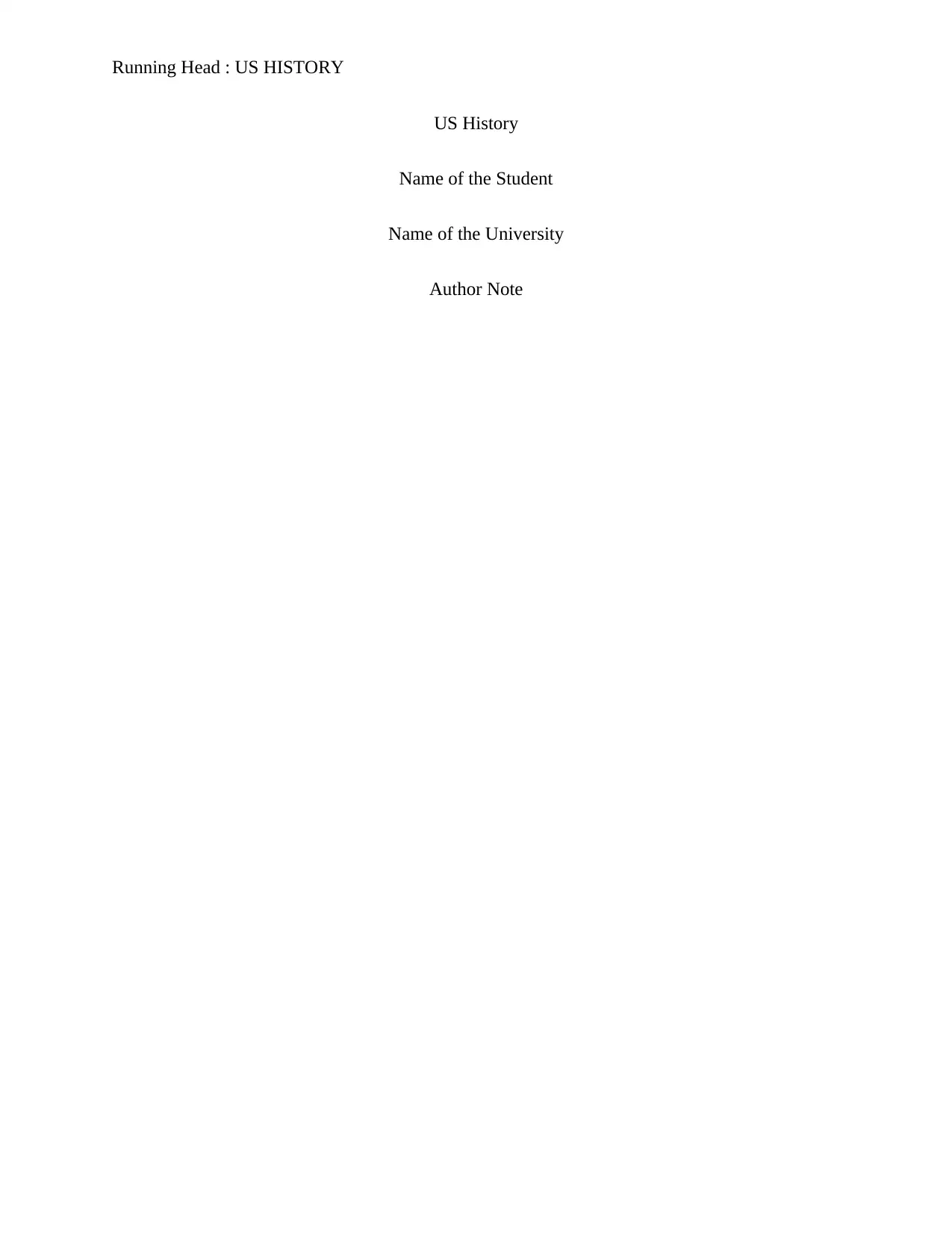
Running Head : US HISTORY
US History
Name of the Student
Name of the University
Author Note
US History
Name of the Student
Name of the University
Author Note
Paraphrase This Document
Need a fresh take? Get an instant paraphrase of this document with our AI Paraphraser
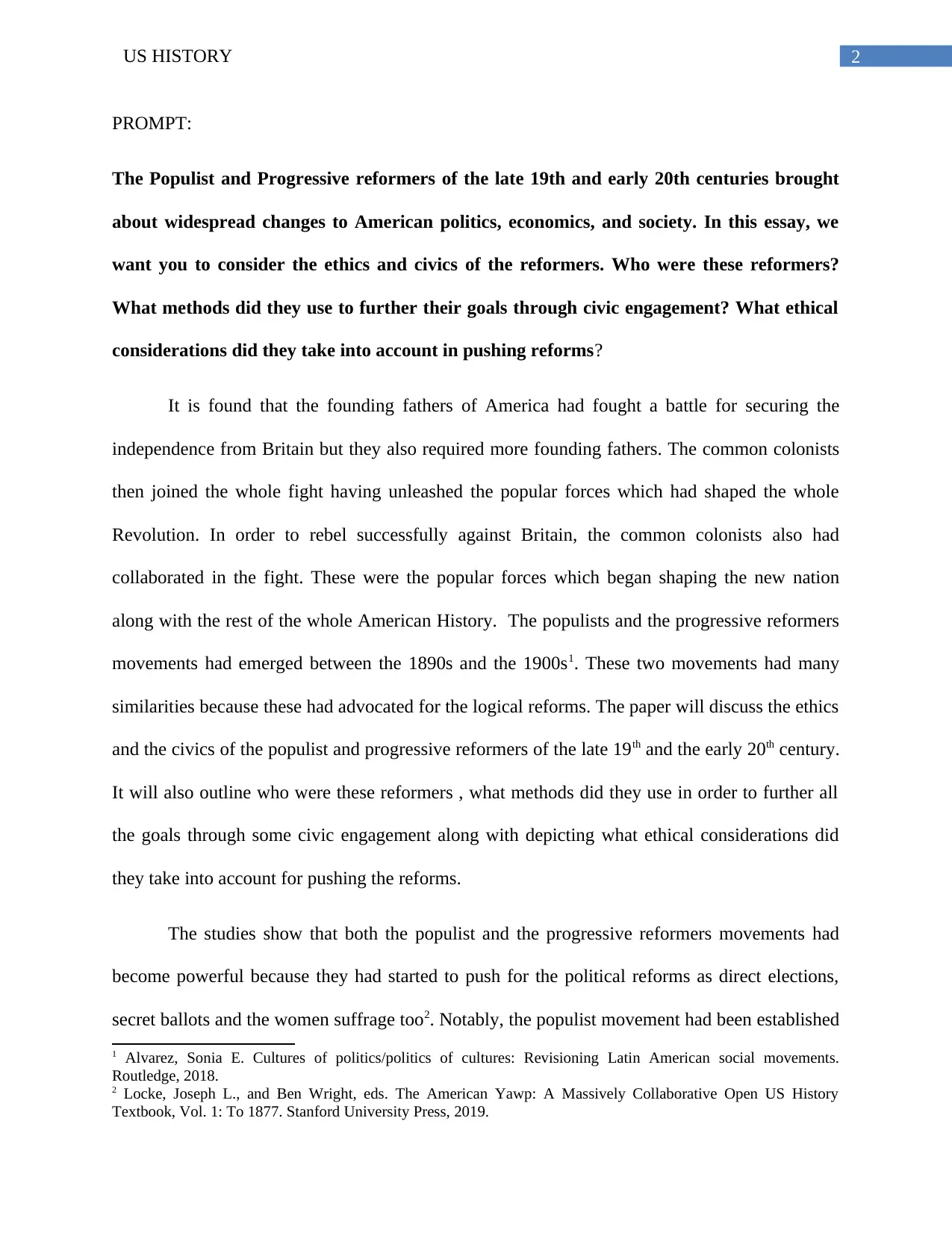
2US HISTORY
PROMPT:
The Populist and Progressive reformers of the late 19th and early 20th centuries brought
about widespread changes to American politics, economics, and society. In this essay, we
want you to consider the ethics and civics of the reformers. Who were these reformers?
What methods did they use to further their goals through civic engagement? What ethical
considerations did they take into account in pushing reforms?
It is found that the founding fathers of America had fought a battle for securing the
independence from Britain but they also required more founding fathers. The common colonists
then joined the whole fight having unleashed the popular forces which had shaped the whole
Revolution. In order to rebel successfully against Britain, the common colonists also had
collaborated in the fight. These were the popular forces which began shaping the new nation
along with the rest of the whole American History. The populists and the progressive reformers
movements had emerged between the 1890s and the 1900s1. These two movements had many
similarities because these had advocated for the logical reforms. The paper will discuss the ethics
and the civics of the populist and progressive reformers of the late 19th and the early 20th century.
It will also outline who were these reformers , what methods did they use in order to further all
the goals through some civic engagement along with depicting what ethical considerations did
they take into account for pushing the reforms.
The studies show that both the populist and the progressive reformers movements had
become powerful because they had started to push for the political reforms as direct elections,
secret ballots and the women suffrage too2. Notably, the populist movement had been established
1 Alvarez, Sonia E. Cultures of politics/politics of cultures: Revisioning Latin American social movements.
Routledge, 2018.
2 Locke, Joseph L., and Ben Wright, eds. The American Yawp: A Massively Collaborative Open US History
Textbook, Vol. 1: To 1877. Stanford University Press, 2019.
PROMPT:
The Populist and Progressive reformers of the late 19th and early 20th centuries brought
about widespread changes to American politics, economics, and society. In this essay, we
want you to consider the ethics and civics of the reformers. Who were these reformers?
What methods did they use to further their goals through civic engagement? What ethical
considerations did they take into account in pushing reforms?
It is found that the founding fathers of America had fought a battle for securing the
independence from Britain but they also required more founding fathers. The common colonists
then joined the whole fight having unleashed the popular forces which had shaped the whole
Revolution. In order to rebel successfully against Britain, the common colonists also had
collaborated in the fight. These were the popular forces which began shaping the new nation
along with the rest of the whole American History. The populists and the progressive reformers
movements had emerged between the 1890s and the 1900s1. These two movements had many
similarities because these had advocated for the logical reforms. The paper will discuss the ethics
and the civics of the populist and progressive reformers of the late 19th and the early 20th century.
It will also outline who were these reformers , what methods did they use in order to further all
the goals through some civic engagement along with depicting what ethical considerations did
they take into account for pushing the reforms.
The studies show that both the populist and the progressive reformers movements had
become powerful because they had started to push for the political reforms as direct elections,
secret ballots and the women suffrage too2. Notably, the populist movement had been established
1 Alvarez, Sonia E. Cultures of politics/politics of cultures: Revisioning Latin American social movements.
Routledge, 2018.
2 Locke, Joseph L., and Ben Wright, eds. The American Yawp: A Massively Collaborative Open US History
Textbook, Vol. 1: To 1877. Stanford University Press, 2019.
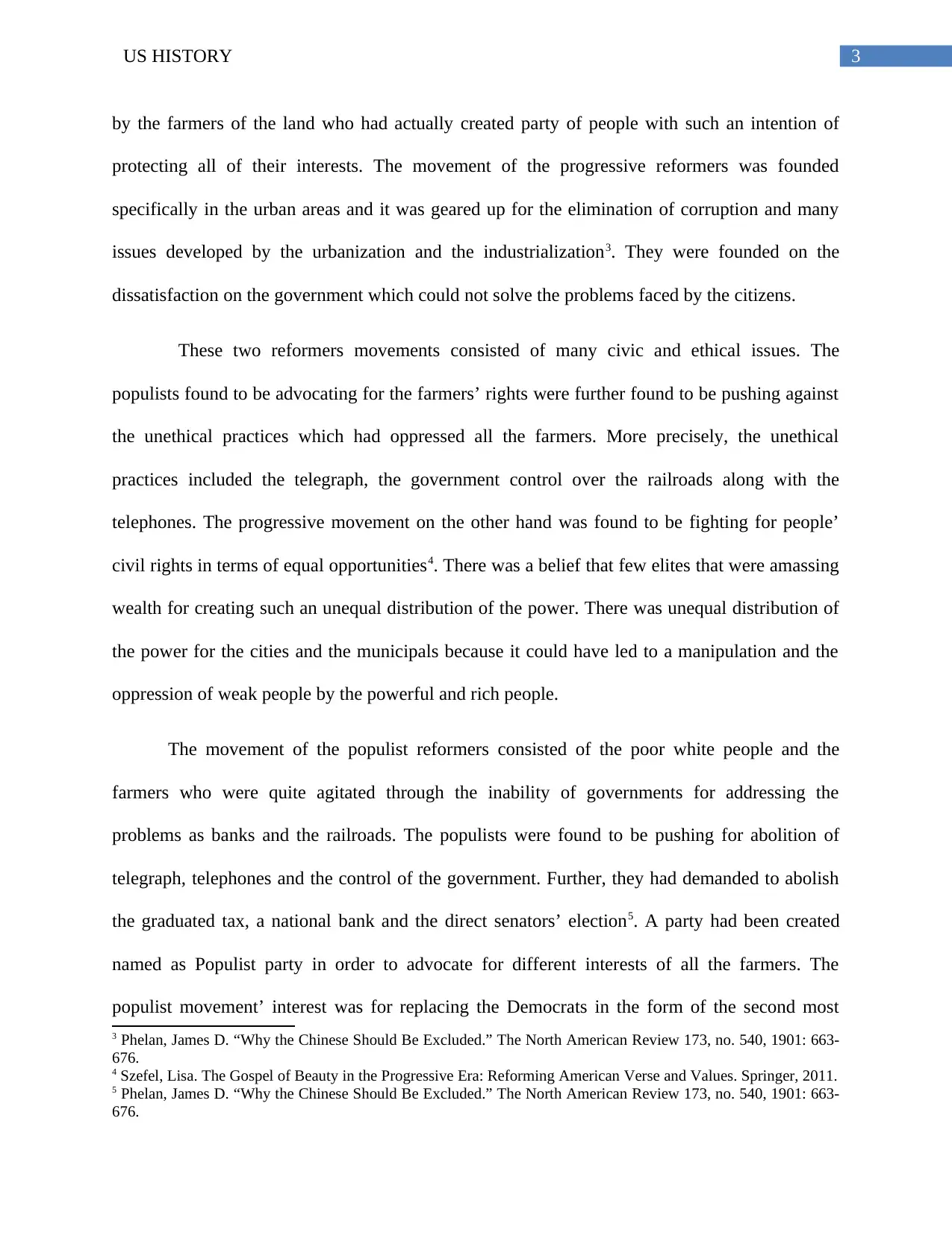
3US HISTORY
by the farmers of the land who had actually created party of people with such an intention of
protecting all of their interests. The movement of the progressive reformers was founded
specifically in the urban areas and it was geared up for the elimination of corruption and many
issues developed by the urbanization and the industrialization3. They were founded on the
dissatisfaction on the government which could not solve the problems faced by the citizens.
These two reformers movements consisted of many civic and ethical issues. The
populists found to be advocating for the farmers’ rights were further found to be pushing against
the unethical practices which had oppressed all the farmers. More precisely, the unethical
practices included the telegraph, the government control over the railroads along with the
telephones. The progressive movement on the other hand was found to be fighting for people’
civil rights in terms of equal opportunities4. There was a belief that few elites that were amassing
wealth for creating such an unequal distribution of the power. There was unequal distribution of
the power for the cities and the municipals because it could have led to a manipulation and the
oppression of weak people by the powerful and rich people.
The movement of the populist reformers consisted of the poor white people and the
farmers who were quite agitated through the inability of governments for addressing the
problems as banks and the railroads. The populists were found to be pushing for abolition of
telegraph, telephones and the control of the government. Further, they had demanded to abolish
the graduated tax, a national bank and the direct senators’ election5. A party had been created
named as Populist party in order to advocate for different interests of all the farmers. The
populist movement’ interest was for replacing the Democrats in the form of the second most
3 Phelan, James D. “Why the Chinese Should Be Excluded.” The North American Review 173, no. 540, 1901: 663-
676.
4 Szefel, Lisa. The Gospel of Beauty in the Progressive Era: Reforming American Verse and Values. Springer, 2011.
5 Phelan, James D. “Why the Chinese Should Be Excluded.” The North American Review 173, no. 540, 1901: 663-
676.
by the farmers of the land who had actually created party of people with such an intention of
protecting all of their interests. The movement of the progressive reformers was founded
specifically in the urban areas and it was geared up for the elimination of corruption and many
issues developed by the urbanization and the industrialization3. They were founded on the
dissatisfaction on the government which could not solve the problems faced by the citizens.
These two reformers movements consisted of many civic and ethical issues. The
populists found to be advocating for the farmers’ rights were further found to be pushing against
the unethical practices which had oppressed all the farmers. More precisely, the unethical
practices included the telegraph, the government control over the railroads along with the
telephones. The progressive movement on the other hand was found to be fighting for people’
civil rights in terms of equal opportunities4. There was a belief that few elites that were amassing
wealth for creating such an unequal distribution of the power. There was unequal distribution of
the power for the cities and the municipals because it could have led to a manipulation and the
oppression of weak people by the powerful and rich people.
The movement of the populist reformers consisted of the poor white people and the
farmers who were quite agitated through the inability of governments for addressing the
problems as banks and the railroads. The populists were found to be pushing for abolition of
telegraph, telephones and the control of the government. Further, they had demanded to abolish
the graduated tax, a national bank and the direct senators’ election5. A party had been created
named as Populist party in order to advocate for different interests of all the farmers. The
populist movement’ interest was for replacing the Democrats in the form of the second most
3 Phelan, James D. “Why the Chinese Should Be Excluded.” The North American Review 173, no. 540, 1901: 663-
676.
4 Szefel, Lisa. The Gospel of Beauty in the Progressive Era: Reforming American Verse and Values. Springer, 2011.
5 Phelan, James D. “Why the Chinese Should Be Excluded.” The North American Review 173, no. 540, 1901: 663-
676.
⊘ This is a preview!⊘
Do you want full access?
Subscribe today to unlock all pages.

Trusted by 1+ million students worldwide
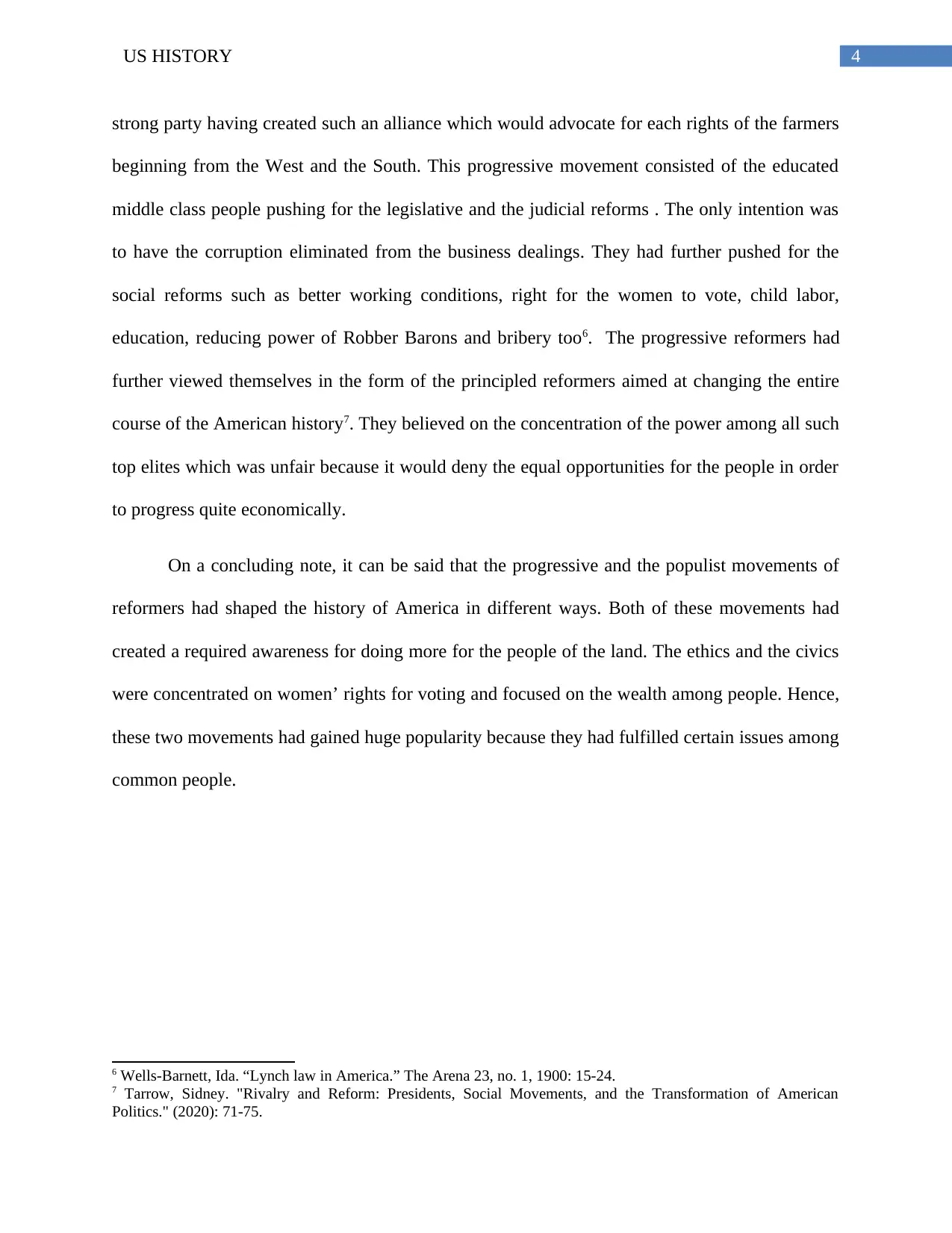
4US HISTORY
strong party having created such an alliance which would advocate for each rights of the farmers
beginning from the West and the South. This progressive movement consisted of the educated
middle class people pushing for the legislative and the judicial reforms . The only intention was
to have the corruption eliminated from the business dealings. They had further pushed for the
social reforms such as better working conditions, right for the women to vote, child labor,
education, reducing power of Robber Barons and bribery too6. The progressive reformers had
further viewed themselves in the form of the principled reformers aimed at changing the entire
course of the American history7. They believed on the concentration of the power among all such
top elites which was unfair because it would deny the equal opportunities for the people in order
to progress quite economically.
On a concluding note, it can be said that the progressive and the populist movements of
reformers had shaped the history of America in different ways. Both of these movements had
created a required awareness for doing more for the people of the land. The ethics and the civics
were concentrated on women’ rights for voting and focused on the wealth among people. Hence,
these two movements had gained huge popularity because they had fulfilled certain issues among
common people.
6 Wells-Barnett, Ida. “Lynch law in America.” The Arena 23, no. 1, 1900: 15-24.
7 Tarrow, Sidney. "Rivalry and Reform: Presidents, Social Movements, and the Transformation of American
Politics." (2020): 71-75.
strong party having created such an alliance which would advocate for each rights of the farmers
beginning from the West and the South. This progressive movement consisted of the educated
middle class people pushing for the legislative and the judicial reforms . The only intention was
to have the corruption eliminated from the business dealings. They had further pushed for the
social reforms such as better working conditions, right for the women to vote, child labor,
education, reducing power of Robber Barons and bribery too6. The progressive reformers had
further viewed themselves in the form of the principled reformers aimed at changing the entire
course of the American history7. They believed on the concentration of the power among all such
top elites which was unfair because it would deny the equal opportunities for the people in order
to progress quite economically.
On a concluding note, it can be said that the progressive and the populist movements of
reformers had shaped the history of America in different ways. Both of these movements had
created a required awareness for doing more for the people of the land. The ethics and the civics
were concentrated on women’ rights for voting and focused on the wealth among people. Hence,
these two movements had gained huge popularity because they had fulfilled certain issues among
common people.
6 Wells-Barnett, Ida. “Lynch law in America.” The Arena 23, no. 1, 1900: 15-24.
7 Tarrow, Sidney. "Rivalry and Reform: Presidents, Social Movements, and the Transformation of American
Politics." (2020): 71-75.
Paraphrase This Document
Need a fresh take? Get an instant paraphrase of this document with our AI Paraphraser
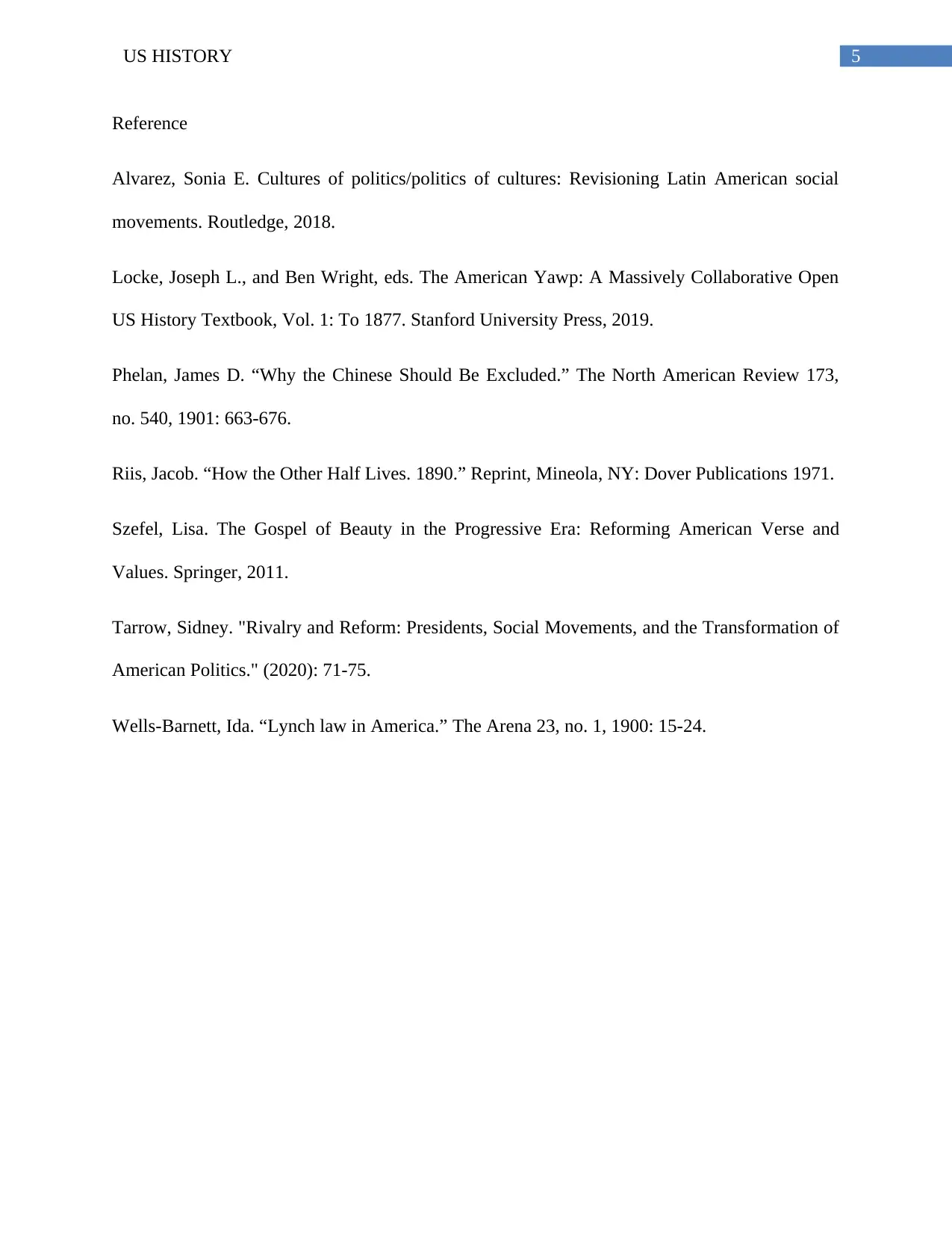
5US HISTORY
Reference
Alvarez, Sonia E. Cultures of politics/politics of cultures: Revisioning Latin American social
movements. Routledge, 2018.
Locke, Joseph L., and Ben Wright, eds. The American Yawp: A Massively Collaborative Open
US History Textbook, Vol. 1: To 1877. Stanford University Press, 2019.
Phelan, James D. “Why the Chinese Should Be Excluded.” The North American Review 173,
no. 540, 1901: 663-676.
Riis, Jacob. “How the Other Half Lives. 1890.” Reprint, Mineola, NY: Dover Publications 1971.
Szefel, Lisa. The Gospel of Beauty in the Progressive Era: Reforming American Verse and
Values. Springer, 2011.
Tarrow, Sidney. "Rivalry and Reform: Presidents, Social Movements, and the Transformation of
American Politics." (2020): 71-75.
Wells-Barnett, Ida. “Lynch law in America.” The Arena 23, no. 1, 1900: 15-24.
Reference
Alvarez, Sonia E. Cultures of politics/politics of cultures: Revisioning Latin American social
movements. Routledge, 2018.
Locke, Joseph L., and Ben Wright, eds. The American Yawp: A Massively Collaborative Open
US History Textbook, Vol. 1: To 1877. Stanford University Press, 2019.
Phelan, James D. “Why the Chinese Should Be Excluded.” The North American Review 173,
no. 540, 1901: 663-676.
Riis, Jacob. “How the Other Half Lives. 1890.” Reprint, Mineola, NY: Dover Publications 1971.
Szefel, Lisa. The Gospel of Beauty in the Progressive Era: Reforming American Verse and
Values. Springer, 2011.
Tarrow, Sidney. "Rivalry and Reform: Presidents, Social Movements, and the Transformation of
American Politics." (2020): 71-75.
Wells-Barnett, Ida. “Lynch law in America.” The Arena 23, no. 1, 1900: 15-24.
1 out of 5
Your All-in-One AI-Powered Toolkit for Academic Success.
+13062052269
info@desklib.com
Available 24*7 on WhatsApp / Email
![[object Object]](/_next/static/media/star-bottom.7253800d.svg)
Unlock your academic potential
Copyright © 2020–2026 A2Z Services. All Rights Reserved. Developed and managed by ZUCOL.